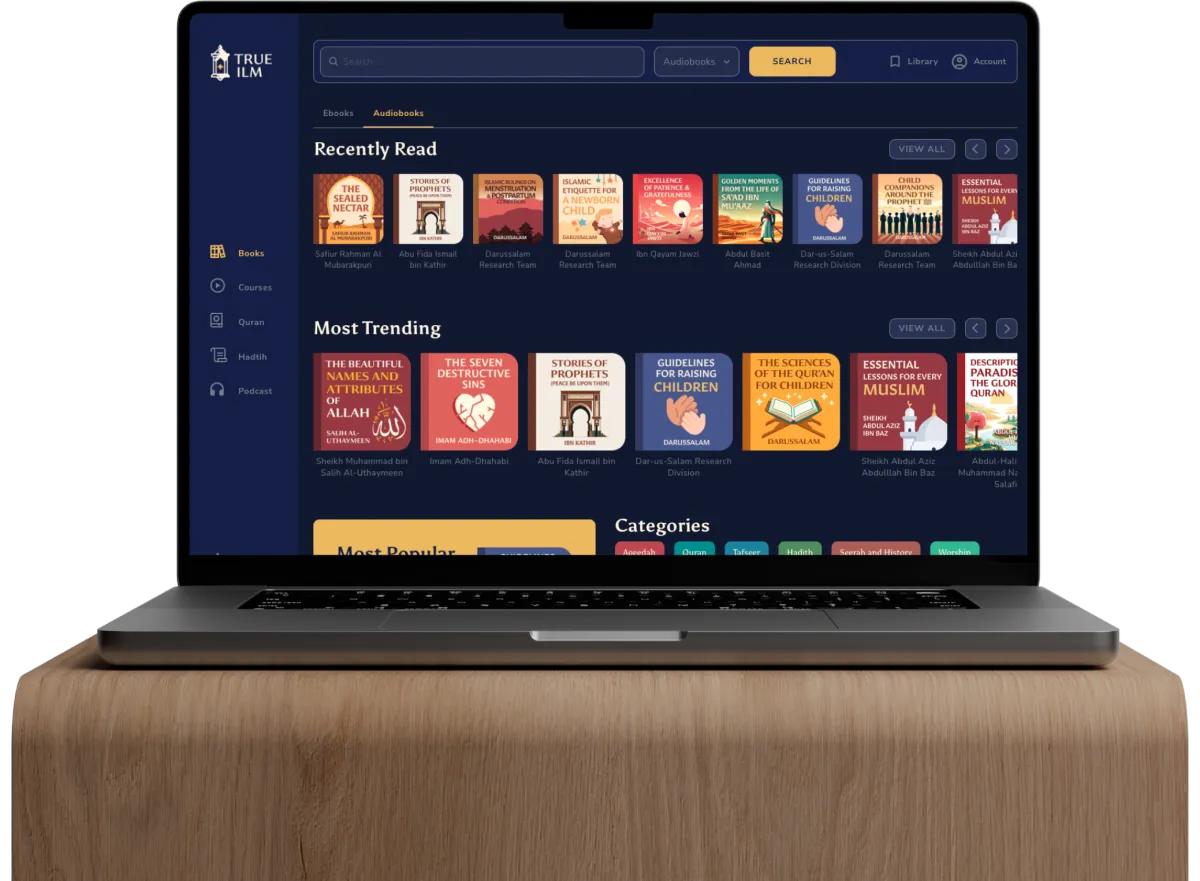Best Hadith Books in English to Guide You
You want to strengthen your connection with Allah. You wish to follow the life of the Holy Prophet (PBUH). You hear terms like hadith, tafsir, sunnah, but don’t know where to start. And when you search online, there’s an overwhelming ocean of Islamic hadith books, Arabic texts, difficult language, and endless choices.
You’re not alone.
Thousands of people struggle to find hadith compilations that are clear, trustworthy, and easy to read—especially in English.
Let’s change that. To gain authentic Islamic knowledge, go to TrueIlm.
Why Islamic Hadith Books Matter
The Qur’an tells us what to believe.
The hadith show us how to live it.
Every prayer, every greeting and every act of kindness you perform—chances are, you learned it from hadith. These collections preserve the exact words and actions of the Holy Prophet (PBUH), guiding us in every step of our daily lives.
But here’s the real issue: which hadith collections can you trust—especially in English?
What’s Holding You Back?
- You’re not fluent in Arabic.
- You don’t know which hadith volumes are authentic.
- You want practical lessons, not just information.
Now imagine:
- Reading authentic hadiths in clear English.
- Finding commentary that makes each hadith easier to act on.
- Gaining peace of mind that you’re learning Islam the right way.
This is where your journey starts—with the right hadith knowlege and the best Quran tafseer in English to match.
What Makes a Hadith Book “Authentic”?
Not all hadith collections are the same. Scholars over centuries carefully categorized each narration based on its chain of transmission and reliability. So how do you know which ones to trust?
Look for books compiled by reputable scholars like:
- Imam Bukhari (Sahih Bukhari)
- Imam Muslim (Sahih Muslim)
- Imam An-Nawawi (Riyad-us-Saliheen, 40 Hadith)
- Imam Tirmidhi (Jami’ at-Tirmidhi)
These books have been authenticated by generations of scholars, making them essential for anyone who wants to follow the real teachings of Islam.
But you still need them in a language you understand, with commentary that helps you apply them today.
Top Hadith Collections in English You Can Rely On
Here’s a carefully selected list of hadith compilations in English that are not only authentic but also easy to understand for English speakers.
- Sahih Bukhari (English Translation)
This is the gold standard in authentic hadith collection. While the full version is detailed, English editions with commentary make it manageable.
✅ Highly authentic
✅ Rich in detail
✅ Great for deeper learners
- Sahih Muslim
If you’re looking for a short but powerful introduction, this book is a gem. Each hadith is packed with wisdom and includes translations and simple explanations.
✅ Over 7,000 hadiths (including repetitions)
✅ Considered the second most authentic book after Sahih Bukhari
✅ Available in English with detailed explanations
- Riyad-us-Saliheen
One of the most popular Islamic hadith compilations, this collection focuses on everyday ethics and behavior. It teaches you how to be kind, patient, and conscious of Allah.
✅ Easy language
✅ Categorized by topic
✅ Perfect for families and beginners
Why You Also Need the Best Quran Tafseer in English
While hadith shows the example of Holy Prophet (PBUH), a Quran tafseer explains Allah’s direct words.
Having the Quran tafseer helps you:
- Understand the context behind ayahs
- Apply verses to modern life
- Clear up misunderstandings
Combining hadith with Quran tafseer makes your learning balanced, complete, and spiritually uplifting.
How to Choose the Right Book for Yourself
You don’t need to read every book. Start with what helps you act today.
Here’s a simple guide:
| Your Need | Recommended Book |
| Beginner | 40 Hadith (An-Nawawi) |
| Family Values | Riyad-us-Saliheen |
| In-depth Learning | Sahih Bukhari |
| Quranic Understanding | Tafseer Ibn Kathir (English) |
Tip: Pair each hadith with a Quran verse using tafseer. That’s how the scholars did it.
Semantically Enriched Guidance (Made Easy!)
To support your Islamic learning journey, let’s use related concepts you might have heard of:
- Sunnah: The lifestyle of the Prophet (PBUH) preserved in hadith.
- Shariah: Islamic law is derived from the Quran and hadith.
- Ijma: Scholarly consensus based on evidence from authentic hadith.
- Fiqh: Islamic jurisprudence that applies these teachings.
By learning hadith, you’re not just reading stories—you’re learning how to live Islam with purpose and clarity.
Visual Learning: How Hadith Transform Real Life
Imagine this: You read a hadith about charity. That same day, you help a neighbor—and you remember the exact words of the Prophet (PBUH) that inspired you.
This is the power of learning with action. Hadith is not for information— it is for transformation.
How This Solves Your Problem
✅ No more confusion
✅ No more outdated or hard-to-read texts
✅ Just authentic, simplified, practical Islamic learning
You get guidance that brings you closer to Allah, helps your family grow in Islam, and gives you confidence in your faith.
Frequently Asked Questions (FAQs)
Q1: What are the most trusted hadith volumes in Islam?
The most trusted hadith volumes in Islam are known as the Kutub al-Sittah (The Six Canonical Books). These include Sahih Bukhari and Sahih Muslim, which are considered the most authentic collections.
Other respected volumes are Sunan Abu Dawood, Jami` at-Tirmidhi, Sunan an-Nasa’i, and Sunan Ibn Majah. Each of these collections was compiled with strict criteria for authenticity and contain valuable insights into the teachings and practices of Holy Prophet (PBUH).
Scholars and students of Islam widely refer to these books for guidance on faith, worship, and daily life.
Q2: Is it necessary to read hadith narrations alongside the Quran tafseer?
Yes, reading hadith narrations alongside Quran tafseer is essential for a deeper and more accurate understanding of the Quran.
Hadiths provide context, explanation, and practical examples of how Holy Prophet (PBUH) implemented Quranic teachings. Many verses in the Quran are general in nature, and the hadiths clarify their meanings and application.
Without the hadith, one may misinterpret or overlook key elements of Islamic teachings. Studying both together ensures a balanced and holistic grasp of Islam.
Q3: Can I rely only on English transla without learning Arabic?
While translated material can offer valuable insights, relying solely on it may limit your understanding of the original meanings. Arabic is a rich and precise language, and certain words or phrases in hadiths carry nuanced meanings that can be lost in translation.
Many scholars recommend learning basic Arabic over time to grasp the deeper context and terminology. However, for beginners or non-Arabic speakers, well-translated and commentary-supported English books of Hadith can still be beneficial.
It’s ideal to use trusted English resources while striving to gradually learn Arabic for a more authentic and complete understanding.
Q4: How to create a study plan to learn both hadith and Quran?
To create a balanced study plan, begin by selecting one authentic hadith book and a beginner-friendly Quranic tafseer. Allocate specific days of the week to each—such as studying Quran tafseer on Mondays, Wednesdays, and Fridays, and hadith on alternate days.
Start with short, manageable portions like one hadith and a few verses with tafseer per session. Take notes, reflect on how the teachings apply to your life, and revisit key lessons regularly.
To deepen your understanding, join study circles or online forums where you can ask questions and gain further insights from scholars or peers.
Q5: Are there mobile apps with authentic hadith narrations and tafseer in English?
Yes, there are many mobile apps that provide authentic hadith narrations such as Hadith Collection, Islam360 and Al Quran (Tafsir & by Word) by Greentech Apps Foundation.
Final Thoughts
The journey to Islamic knowledge doesn’t need to be overwhelming. All you need is a clear path. With the right hadith compilations, reliable Quran tafseer, and a desire to grow, your spiritual connection will flourish.
Start today—read one hadith. Let it change your tomorrow. Discover more interesting blogs on Overlypost.













Post Comment